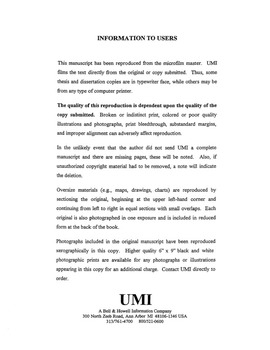| dc.contributor.advisor | Copeland, Gary, | en_US |
| dc.contributor.author | Cohen, Lauren Michelle. | en_US |
| dc.date.accessioned | 2013-08-16T12:30:30Z | |
| dc.date.available | 2013-08-16T12:30:30Z | |
| dc.date.issued | 1999 | en_US |
| dc.identifier.uri | https://hdl.handle.net/11244/5802 | |
| dc.description.abstract | Two primary methods of study are employed in this project. First, data were gathered from 1,112 confirmation hearings for federal judges and 88 confirmation hearings for cabinet secretaries-designate between 1977 and 1998. These data are then submitted to logistic regression analysis to determine the extent to which they affect the likelihood of interest group participation in the confirmation process. | en_US |
| dc.description.abstract | In addition, qualitative data also are used. These data are gathered from field research during which unstructured interviews were conducted with 23 individuals actively involved in the confirmation process. These individuals include two former senators, a former judicial nominee, a former U.S. ambassador, eight interest group leaders, and seven current and former Senate staff members. | en_US |
| dc.description.abstract | The analysis of this data yields several important findings. First, despite the conventional wisdom, formal interest group participation in the confirmation process has not increased since 1987. In fact, formal participation has almost steadily declined since the late 1970s. At the same time, informal participation by interest groups in the confirmation process has increased dramatically since the late 1980s. Today, interest groups work behind the scenes to influence confirmation outcomes. Further, interest groups are strategic actors. They participate more frequently in the confirmation process for high-level appointees than they do when a nominee has been nominated to fill a vacancy in a lower-level office. The data also demonstrate that there are a wide range of consequences that can be associated with interest group participation, including lengthy waits for confirmation, a reduced likelihood of confirmation, and a breakdown of comity breakdown of comity among senators engaged in the confirmation process. | en_US |
| dc.description.abstract | Interest groups are powerful actors in the confirmation process for federal judges, ambassadors, and cabinet secretaries. Yet, they are often ignored in treatments of confirmation dynamics. This dissertation sheds light on the causes and consequences of interest group participation in Senate confirmation decisions. | en_US |
| dc.format.extent | xii, 269 leaves ; | en_US |
| dc.subject | Cabinet officers Selection and appointment United States. | en_US |
| dc.subject | Ambassadors Selection and appointment United States. | en_US |
| dc.subject | Pressure groups United States. | en_US |
| dc.subject | Judges Selection and appointment United States. | en_US |
| dc.subject | United States. Supreme Court Officers and employees Selection and appointment. | en_US |
| dc.subject | United States. Congress. Senate Powers and duties. | en_US |
| dc.subject | Political Science, General. | en_US |
| dc.title | Warring factions: Senators, nominees, and interest groups in the Senate confirmation process. | en_US |
| dc.type | Thesis | en_US |
| dc.thesis.degree | Ph.D. | en_US |
| dc.thesis.degreeDiscipline | Department of Political Science | en_US |
| dc.note | Source: Dissertation Abstracts International, Volume: 60-05, Section: A, page: 1740. | en_US |
| dc.note | Adviser: Gary Copeland. | en_US |
| ou.identifier | (UMI)AAI9929555 | en_US |
| ou.group | College of Arts and Sciences::Department of Political Science | |
